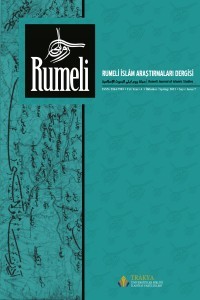Kur’ân ve Sünnete Göre İsimlendirme
İsim, her varlığı diğerinden ayıran en bariz özelliktir. Aynı kökten gelen “tesmiye” kelimesi ise; Kur’an’da hem çocuğa isim vermek anlamında hem de müşriklerin hiçbir delile dayanmadan putlarını ilah olarak nitelendirmesinin, herhangi bir geçerliliği olmadığını ifade etmek üzere kullanılmaktadır. Bu makalede Müslümanlığın temelini oluşturduğu dini ve kültürel kimliği koruma yolunun, göründüğünden daha büyük bir işleve sahip olan isimlendirmeden geçtiğini dikkate alarak, Kur’an’ın ve Hz. Peygamber’in Müslüman bir toplum ve medeniyet inşa ederken, isimlendirme meselesini nasıl ele aldığı tespit edilmeye çalışılmıştır. Böylece toplumda bir sorun olarak görülen fakat birçok kişinin doğal karşıladığı isimlendirme konusuna bir perspektif sunulmuş olacaktır. Bir milletin gerek dünyaya yeni gelen çocukları gerekse kullandığı mekânlar için, kendi değerlerine uymayan isimler koymasının, aslında dünya ölçeğinde kültürel istilanın yayılmasıyla da doğrudan ilişkili olduğu söylenebilir.
Anahtar Kelimeler:
Kur’ân, İsim, Tesmiye (İsimlendirme)
Naiming in the Qur'an and Sunnah
It can be said that putting names that don't fit their own values for both children and place names they use is in fact related to the spread of the cultural invasion on the world scale directly Name" is the most apparent feature that distinguishes every creature from one another. The word "Tasmiyah", which comes from the same root as "isim" (name), is used for denoting the act of naming children and also for pointing the invalidity of the idolaters' naming their idols as gods. Taking into consideration that the cultural identity Muslims based on goes through naming which has much greater function than it seems, in this article we have tried to determine how Quran and Prophet Mohammed approached the issue of naming while building a Muslim society and civilization. Thus, it will be possible to offer a perspective on the naming issue that seems as a problem in society yet plenty of people react normally.
___
- Dr. Öğr. Ü. Feim GASHI Dr. Öğr. Ü. Yakup BIYIKOĞLU
- ISSN: 2564-7903
- Yayın Aralığı: Yılda 2 Sayı
- Başlangıç: 2018
- Yayıncı: Trakya Üniversitesi
Sayıdaki Diğer Makaleler
Tasavvuf ve Yogada Vecdin Psikofizyolojisi
Bir İslam Sanatı olarak soru sormak: İlmu'l-ihtilaf ve görüş ayrılıklarının kurumsallaşması
Çin Kaynaklarına Göre, Çin’deki Tarihi Camiiler Hakkında Araştırma
Üsküplü İshak Çelebi Dîvanı'nda Beşerî Hayat
Zeydiyye: Ortaya Çıkışı, Öncüleri, Alt Grupları, Doktrinleri ve Diğer Mezhepler ile İlişkileri
Kur’ân ve Sünnete Göre İsimlendirme
